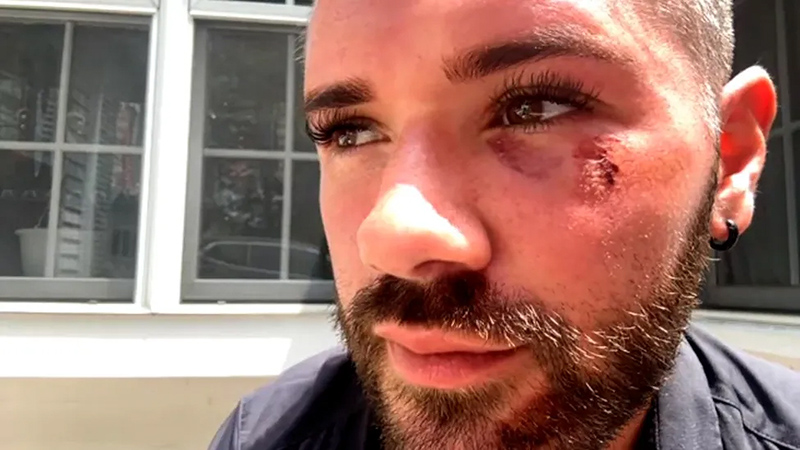Deadlier Form of Mpox Poses Global Health Threat
Health officials are urging vaccination and behavior changes as they monitor a more deadly strain of mpox that could spread globally.

The Centers for Disease Control and Prevention (CDC) is warning Americans about a deadlier form of mpox that is spreading rapidly through the Democratic Republic of the Congo (DRC) and could potentially spread worldwide, saying it “poses a global threat.”
According to findings published in the CDC journal Morbidity and Mortality Weekly Report, the DRC is battling a record number of cases of pox, fueled by a strain with a higher death rate than a previous variant that spread rapidly throughout Europe and the United States in 2022.
The 2022 strain, also known as clade II, has a death rate ranging from 0.1% to 3.6% of cases, according to various studies.
With this more lethal strain, known as clade I, the death rate among patients ranges from 1.4% to 10%.
According to the CDC, between January 2023 and April 14, 2024, there were “multiple provincial outbreaks” of the clade I strain of mpox, with an estimated total of 19,919 cases and 975 deaths, or a death toll of nearly 1 out of every 20 patients.
Cases of clade I mpox were also reported in 25 of 2 provinces and in the capital city of Kinshasa.
Children are especially vulnerable to this more deadly strain of mpox. Approximately two-thirds of suspected cases and more than three-quarters of suspected deaths have occurred in persons under the age of 15.
Mpox is spread through close personal contact, typically skin-to-skin contact, though not always through sexual contact. The disease has long been endemic to Africa, since it can be spread to humans via contact with animals such as monkeys.
In the most recent outbreak, data suggests that outbreaks “involve multiple introductions from animal hosts” within the DRC and are subsequently passed on through human-to-human contact.
Anyone can get mpox, regardless of age or sexual orientation.
However, men who have sex with men are particularly at risk, and were the primary vectors of the clade II outbreak of 2022.
Initial symptoms of the disease include fever, chills, exhaustion, headache, and muscle weakness, followed by a rash with lesions that scab over and slowly heal over a period of weeks.
In at least two of the multiple outbreaks within the DRC, sexual transmission of clade I mpox was reported among men who have sex with men and among male and female sex workers and their contacts.
Due to the clade I strain’s relatively rapid spread within the DRC, the CDC is warning that failure to contain the virus could lead to a global outbreak of the strain.
At present there have been no reports of clade I infections in the United States.
According to the CDC, 343 samples tested positive for mpox from December 2023 to mid-April 2024, with all cases being determined to be part of the clade II strain. But that doesn’t mean there is no risk of the clade I strain eventually being spread through various means and taking root in the United States.
Doctors in the U.S. are being advised to encourage patients most at risk — including gay and bisexual men, or even men engaging in same-sex behavior who do not identify as such — to get vaccinated.
The vaccine that was used to protect against the clade II strain of the virus — the two-dose Jynneos shot — is considered effective against the clade I strain. People living with HIV and other autoimmune diseases are encouraged to receive both doses to reduce their chance of contracting mpox, which can be dangerous for those with weakened immune systems.
The CDC is also advising doctors to have their at-risk patients complete the vaccine.
Since the 2022 outbreaks, only 23% of people at risk of mpox infection in the United States have received two doses. Since then, occasional outbreaks of clade II mpox have occurred in various states, including North Carolina, New York, and Virginia, though at a much lower frequency.
A recent study published in February found that the 2022 clade II outbreak was largely curbed by changes in personal behavior rather than the vaccine. This underscores not only the possible necessity of fully vaccinating at-risk populations but also the importance that personal choices, such as limiting the number of sex partners or abstaining from sex altogether, can help prevent future outbreaks.
Support Metro Weekly’s Journalism
These are challenging times for news organizations. And yet it’s crucial we stay active and provide vital resources and information to both our local readers and the world. So won’t you please take a moment and consider supporting Metro Weekly with a membership? For as little as $5 a month, you can help ensure Metro Weekly magazine and MetroWeekly.com remain free, viable resources as we provide the best, most diverse, culturally-resonant LGBTQ coverage in both the D.C. region and around the world. Memberships come with exclusive perks and discounts, your own personal digital delivery of each week’s magazine (and an archive), access to our Member's Lounge when it launches this fall, and exclusive members-only items like Metro Weekly Membership Mugs and Tote Bags! Check out all our membership levels here and please join us today!































You must be logged in to post a comment.